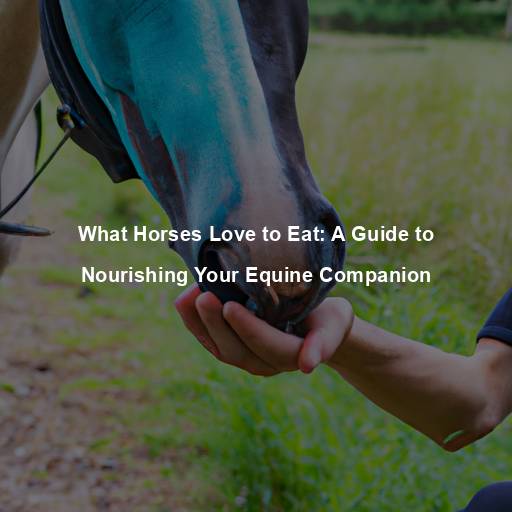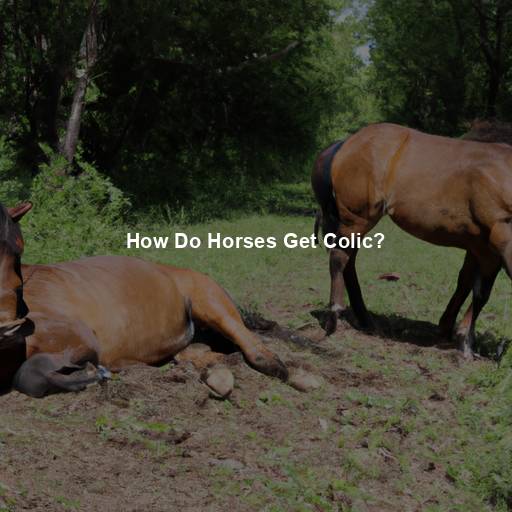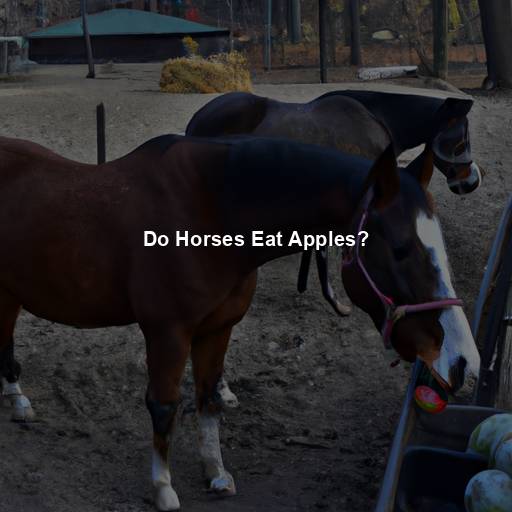What Horses Love to Eat: A Guide to Nourishing Your Equine Companion
Last Updated on July 17, 2023 by Evan
Horses are magnificent creatures, known for their grace, strength, and beauty. As responsible horse owners, it is our duty to provide them with the best care possible, and this includes a balanced and nutritious diet. Just like humans, horses have specific dietary needs that must be met to ensure their overall health and well-being. In this comprehensive guide, we will delve into the world of equine nutrition and explore what horses love to eat.
Contents [hide]
- 1 Understanding Equine Digestion: The Key to a Healthy Diet
- 2 Understanding Your Horse’s Individual Needs
- 3 Understanding Forage: The Foundation of a Horse’s Diet
- 4 Supplements: Enhancing Equine Nutrition
- 5 Tailoring the Diet to Your Horse’s Needs
- 6 FAQs: What Horses Love to Eat
- 6.1 What are some common foods that horses love to eat?
- 6.2 Can horses eat grass all the time?
- 6.3 Should I feed my horse hay?
- 6.4 Can horses eat fruits and vegetables?
- 6.5 What grains can horses eat?
- 6.6 Are there any foods that horses should avoid?
- 6.7 Can horses eat sugary treats?
- 6.8 How important is freshwater in a horse’s diet?
Understanding Equine Digestion: The Key to a Healthy Diet
Before we dive into the specifics of what horses love to eat, it is essential to understand the unique nature of equine digestion. Horses are herbivores with a relatively delicate digestive system designed for a constant intake of fibrous plant material. Their digestive tract is optimized for the efficient breakdown of cellulose, the main component of plant cell walls.
The Importance of Forage in a Horse’s Diet
When it comes to keeping horses healthy and happy, there’s no denying the importance of forage in their diet. Whether it’s the lush green pasture grass or the golden strands of hay, this natural source of nutrients is the bedrock of their nutrition. From fiber to gut health, forage plays a vital role in keeping their digestive system in prime condition. After all, horses are natural grazers, and having access to forage throughout the day is essential for their overall well-being.
Types of Forage
- Pasture Grass: Fresh, well-maintained pasture grass is an excellent source of nutrition for horses. It offers a variety of grass species, each with its unique nutritional profile. Horses enjoy grazing on lush pasture, which provides them with essential vitamins, minerals, and energy.
As the seasons change and pasture grass becomes scarce, it’s time to turn our attention to the enigmatic world of hay. A peculiar but essential staple in a horse’s diet, hay takes center stage when the winter months approach. Offering an array of options, from the illustrious timothy to the exquisite alfalfa and bermudagrass, providing high-quality hay is a perplexing yet vital task to fulfill the nutritional needs of these majestic creatures. Savouring each bite with gusto, horses serendipitously partake in a symphony of natural chewing behavior, ensuring a harmonious digestive system as these mysterious strands of hay weave their magic.
Supplements: Enhancing Your Horse’s Diet
While forage forms the basis of a horse’s diet, certain supplements can be beneficial to address specific nutritional requirements. It is important to note that supplements should be used to complement a balanced diet and not as a substitute for poor-quality forage.
Grain and Concentrates
When it comes to nourishing our equine companions, oats have earned quite a reputation. These easily digested grains are a go-to choice for horse owners looking to provide a burst of energy. Yet, let’s not get too carried away, as excessive oat consumption can leave our equine friends puzzled with weight gain or unforeseen metabolic troubles. Moderation is key, folks!
- Commercial Feed: Commercial horse feeds are formulated to provide a balanced combination of essential nutrients, including vitamins, minerals, and protein. These feeds are available in various forms, such as pellets or textured feeds, and are designed to meet the specific needs of different horses, including those in specific life stages or with specific dietary requirements.
Vitamins and Minerals
- Salt: Horses require a sufficient intake of salt to maintain proper hydration and electrolyte balance. Offering a salt block or providing loose salt in their feed can help ensure they meet their sodium requirements.
When it comes to our equine friends, ensuring their diets are well-rounded can sometimes be a perplexing task. We all want the very best for them, but the quality of forage can fluctuate, leaving certain minerals lacking in their diets. It’s during these moments of uncertainty that the expertise of a veterinarian or equine nutritionist shines through, as they delicately assess the situation and recommend specialized mineral supplements to address any deficiencies. After all, the vibrant health of our noble companions deserves nothing less than the utmost care and attention.
Understanding Your Horse’s Individual Needs
While the information provided above gives a general overview of what horses love to eat, it is crucial to remember that every horse is unique and has individual dietary requirements. Several factors, such as age, breed, workload, and overall health, play a role in determining the optimal diet for your horse.
Consulting with an Equine Nutritionist
When formulating a diet plan for your horse, it is highly recommended to consult with a qualified equine nutritionist or your veterinarian. They can assess your horse’s specific needs and help you create a balanced and tailored diet plan.
Monitoring Your Horse’s Body Condition Score
Regularly monitoring your horse’s body condition score is essential to ensure they are receiving an appropriate diet. A body condition score is a numerical rating system that assesses the amount of fat covering a horse’s body. It helps determine if adjustments need to be made to their feeding regimen to maintain optimal weight and overall health.
The Role of the Stomach and Small Intestine
As majestic creatures, horses have a fascinating process when it comes to nourishment. Once they have indulged in a hearty meal, the food embarks on a journey through their intricate system. Beginning with the graceful passage into the depths of the stomach, where the magic of digestion commences. Within this mysterious chamber, the stomach diligently releases its potent acids, working tirelessly to dismantle the food into more manageable components.
The Importance of Fiber and Microbial Fermentation
Fiber is a crucial component of a horse’s diet. It provides bulk to the digestive system and stimulates natural gut movements. Horses are hindgut fermenters, which means that fiber is broken down by beneficial microbes in the cecum and large intestine through a process called fermentation. This fermentation produces volatile fatty acids, which are a significant source of energy for the horse.
Balancing Nutritional Requirements
When considering what horses love to eat, it is important to balance their nutritional requirements. Horses need a mix of carbohydrates, proteins, fats, vitamins, and minerals to thrive. The specific amounts and ratios will vary depending on factors such as age, breed, and activity level.
Understanding Forage: The Foundation of a Horse’s Diet
Forage should be the primary component of a horse’s diet. It provides the necessary fiber and nutrients for optimal digestive health. Understanding the different types of forage available is crucial for providing a well-rounded diet for your horse.
Pasture Grass: A Nutrient-Rich Option
Fresh and well-maintained pasture grass provides a variety of grass species that offer essential nutrients. Horses enjoy grazing on lush pasture, which provides them with vitamins, minerals, and energy. However, it is important to manage pasture rotation and control grazing to prevent overconsumption and maintain the quality of the pasture.
Hay: A Staple in Horse Nutrition
In times when nature’s buffet seems to dwindle and the earth’s thirst remains unquenched, hay emerges as a lifeline for our beloved grazers. As the seasons change and winter casts its icy grip, or in the arid landscapes yearning for rain, the significance of this forage cannot be overstated. A cornucopia of fine selections like timothy, alfalfa, and bermudagrass stands ready to cater to their nutritional cravings. Not only does hay satiate the innate desire for munching, but it also acts as a safeguard against troublesome digestive woes.
Alternative Forage Options
When it comes to feeding our hoofed companions, the options are as vast as a sprawling pasture. While the usual suspects like grass and hay take center stage, there’s a whole world of alternative forage waiting to be explored. From the mysterious allure of haylage to the enigmatic charm of silage, these unconventional options bring an air of excitement to the horse’s dinner table, offering not only a change in taste but also a treasure trove of additional nutrients. And let’s not forget about chaff, the unsung hero that adds texture and intrigue to the equine dining experience.
Supplements: Enhancing Equine Nutrition
While forage forms the foundation of a horse’s diet, certain supplements can help meet specific nutritional requirements. It is important to note that supplements should only be used to complement a balanced diet and should not be relied upon as the primary source of nutrition.
Grain and Concentrates: Providing Energy
When it comes to fueling our equine companions, grains like oats and barley often take center stage as power-packed energy sources. But caution must ride alongside generosity, for overindulging in grains can saddle our horses with unwanted weight gain and metabolic conundrums. Fear not, as the equestrian market offers a cavalry of specially-designed horse feeds, carefully concocted to skillfully blend all the vital nutrients our four-legged friends need to thrive. Keep the balance, embrace the equine energy, and watch them gallop towards a healthy existence.
Vitamins and Minerals: Essential for Horse Health
Ensuring the well-being of our equine friends can sometimes be a perplexing task, as their nutritional needs may vary depending on individual circumstances. While the bulk of their required nutrients can be obtained through high-quality forage, there are instances where supplementation becomes a tantalizing option. To guarantee that our noble steeds meet their sodium needs, salt blocks or loose salt can come to the rescue. Additionally, expert advice from a veterinarian or equine nutritionist can shed light on specific mineral supplements that may be needed to rectify any potential deficiencies.
Tailoring the Diet to Your Horse’s Needs
Horses, majestic creatures that they are, possess an awe-inspiring level of diversity, rendering their dietary preferences a perplexing enigma. Valiant factors such as age, breed, workload, and overall health dance intricately, influencing the nutritional symphony that must be custom-designed for each equine individual. Precision is paramount when sculpting their meal plan to ensure their vibrant well-being transcends limitations.
Consulting with Professionals
To develop a well-balanced diet plan for your horse, it is highly recommended to consult with an equine nutritionist or your veterinarian. They can assess your horse’s specific needs and provide personalized recommendations.
Monitoring and Adjusting
Keeping a close eye on your horse’s body condition score is crucial for their optimal health. It’s important to regularly assess their weight and make any necessary adjustments to their diet in order to meet their specific energy needs. By tracking their body condition score, which ranges from 1 to 9 with 5 being ideal, you can make well-informed decisions about their nutrition that will contribute to their overall well-being.
Variety in Forage Options
Did you know that horses, just like us, enjoy having a diverse diet? By offering them a variety of forage options, you can keep them intrigued and enthusiastic about their meals. While pasture grass and hay are essential components of their diet, why not spice things up by introducing different types of hay or allowing them access to various pastures? This will not only provide horses with an array of flavors and textures but also keep their taste buds guessing.
Grass Varieties
Different grass species have varying tastes and nutritional profiles. Horses may have preferences for certain grasses based on their flavors and textures. Experimenting with different grass species can help you determine your horse’s preferences and provide them with a diverse grazing experience.
Hay Types
Hay comes in various types, and horses may have preferences for certain varieties. Some horses enjoy the sweetness of alfalfa hay, while others may prefer the coarser texture of timothy hay. Offering different types of hay can add excitement to their meals and cater to their individual tastes.
Exploring Healthy Treat Options
Indulging your equine companion with delectable treats presents an unparalleled opportunity to establish a profound connection and extol their diligent efforts or exceptional conduct. Nonetheless, the utmost care must be taken in selecting nourishing edibles that harmonize seamlessly with their equine palate. Ensuring the optimal fusion of tantalizing flavors and equine-approved ingredients is crucial for rewarding your majestic companion.
Fruit and Vegetable Treats
Many fruits and vegetables can be offered as treats to horses in moderation. Carrots, apples, and watermelon are popular choices among horses and provide natural sweetness and crunch. Remember to cut fruits and vegetables into small, manageable pieces to prevent choking hazards.
Herbs and Spices
In the enchanting world of equines, horses possess extraordinary olfactory and gustatory abilities, allowing them to revel in the intricate nuances of different herbs and spices. Exquisite fragrances such as mint, basil, rosemary, and cinnamon transcend the mundane as they delicately dance upon their palate. These fragrant wonders, whether gently sprinkled upon their feed or presented as delectable morsels, not only infuse their meals with an extraordinary array of flavors but may also bestow upon them additional healthful blessings.
Introducing Healthy Additions to Meals
Imagine taking your horse’s meals to the next level with delicious and nutritious enhancements. These enticing additions not only provide a burst of flavor but also boost their overall health. Plus, they’ll be left perplexed by the delightful surprises that await their taste buds.
Flaxseed or Chia Seeds
Discover the small but mighty powerhouses that will leave your equine companions bursting with vibrant health. Tantalize their taste buds and indulge their senses with the magnificent duo of flaxseed and chia seeds. Imbued with the essential omega-3 fatty acids, their magical properties bring harmony to your horse’s coat and soothing relief to their body. Embrace the perplexing allure of these wholesome additions and witness the vibrant transformation unfold before your very eyes.
Healthy Oils
Incorporating small amounts of healthy oils, such as flaxseed oil or coconut oil, into a horse’s diet can provide additional fat and calories. These oils can improve the palatability of their feed and add a glossy sheen to their coat.
The Importance of Observation and Experimentation
Discovering the delectable dining preferences of these majestic creatures is a journey filled with curiosity and trial. As each equine possesses a distinctive palate, it behooves us to delve into the realm of observation and daring innovation. Observe their reactions to varied victuals, keenly noting the foods that ignite their equine ecstasy. On this gastronomic odyssey, offer them petite portions of novel nourishment, gradually acquainting them with unfamiliar flavors to ensure seamless digestion.
Catering to Senior Horses and Picky Eaters
Senior horses or those with dental issues may have specific dietary preferences or challenges. Providing softer, more easily chewed options such as soaked hay cubes or hay pellets can help ensure they receive the necessary nutrition. For picky eaters, gradually introducing new foods and offering a variety of flavors can encourage them to expand their palate.
FAQs: What Horses Love to Eat
What are some common foods that horses love to eat?
Horses have an insatiable palate, delighting in a smorgasbord of delectable delights. From the verdant allure of freshly sprung grass to the comforting crunch of golden hay, their gustatory preferences know no bounds. But their appetite extends beyond mere foliage; the equine epicures savor the occasional indulgence of vibrant carrots, juicy apples, and an array of tantalizing fruits and vegetables. Nonetheless, it is crucial to navigate the labyrinthine realm of equine nutrition, ensuring a harmonious symphony of essential nutrients to satiate their voracious cravings.
Can horses eat grass all the time?
When it comes to horse grazing, finding the right balance is key. While horses certainly enjoy the lush greenery of fresh grass, it’s vital to exercise caution. Letting them roam freely in pastures might seem idyllic, but keeping a close eye on their grass consumption is a must. Overindulgence can pave the way for a host of issues like nutritional imbalances, weight gain, or even digestive troubles. That’s where supplementary alternatives like hay come into play, guaranteeing a well-rounded diet for our equine friends.
Should I feed my horse hay?
Without a doubt, the feeding of hay plays a crucial role in ensuring the optimal health and well-being of our beloved horses. It is an intrinsic piece of their dietary puzzle, providing not only the vital roughage needed for proper digestion but also acting as a formidable shield against potential adversaries like colic and the mind-numbing effects of boredom. It is imperative to nurture our equine companions with high-quality hay, which ought to serve as their dietary cornerstone when they are not frolicking freely in pastures. As equestrians, we must navigate the myriad options available, such as the alluring Timothy, the resilient Bermuda, or the robust Alfalfa, while always keeping in mind our horse’s unique preferences and specific nutritional requirements.
Can horses eat fruits and vegetables?
It’s no secret that horses have a sweet tooth for the occasional fruity indulgence. While carrots and apples are the equine equivalent of decadent desserts, it’s important not to turn these delicious treats into the main course. Horses relish these offerings as rewards for their arduous training or as a well-deserved break from their routine. Nevertheless, it’s imperative to steer clear of toxic temptations like avocados or onions, as they could leave our majestic companions feeling more perplexed than pleased.
What grains can horses eat?
When it comes to fueling our equine companions, grains can be a tempting addition to their diet. However, like any dietary decision, a delicate balance must be struck. Oats, barley, corn, and bran may seem like suitable options, yet it’s crucial to tread this path with caution. Seeking advice from a knowledgeable veterinarian or equine nutritionist is paramount, ensuring that your horse’s age, weight, and level of activity are meticulously considered. Within this perplexing realm, finding the ideal grain formula might just be the elusive key to equine wellbeing.
Are there any foods that horses should avoid?
Yes, there are several foods that horses should avoid. Chocolate, caffeine, and alcohol are toxic to horses and should never be fed to them. Other foods to avoid include onions, garlic, tomatoes, potatoes, and any food that has gone bad or moldy. Horses have sensitive digestive systems, and these foods can cause serious health issues or even be fatal.
Can horses eat sugary treats?
While horses may enjoy sugary treats, it’s best to limit their intake. Too much sugar can lead to weight gain, insulin resistance, and laminitis, a painful hoof condition. If giving treats, opt for healthier options like carrots or apples, or consider specially formulated horse treats with reduced sugar content.
How important is freshwater in a horse’s diet?
Freshwater is crucial for a horse’s overall health and proper digestion. Horses need access to clean and fresh water at all times, even during grazing or stabled periods. Adequate hydration helps prevent colic, aids in digestion, and regulates body temperature. Regularly monitor water sources and ensure they are clean and easily accessible for your horse.







